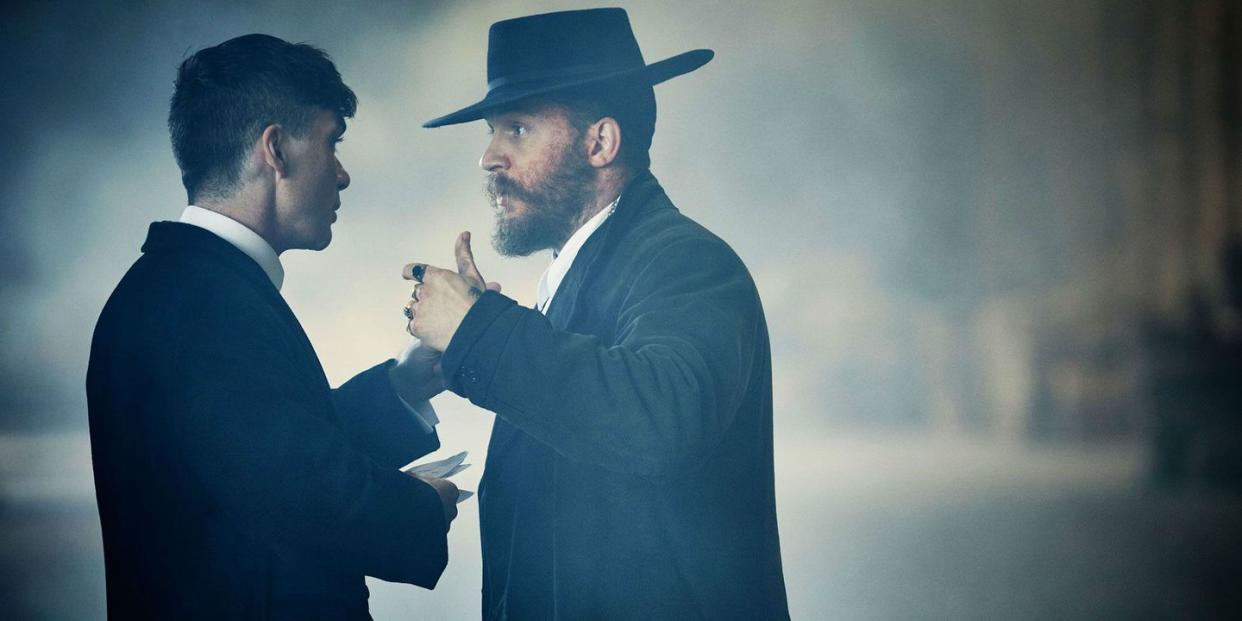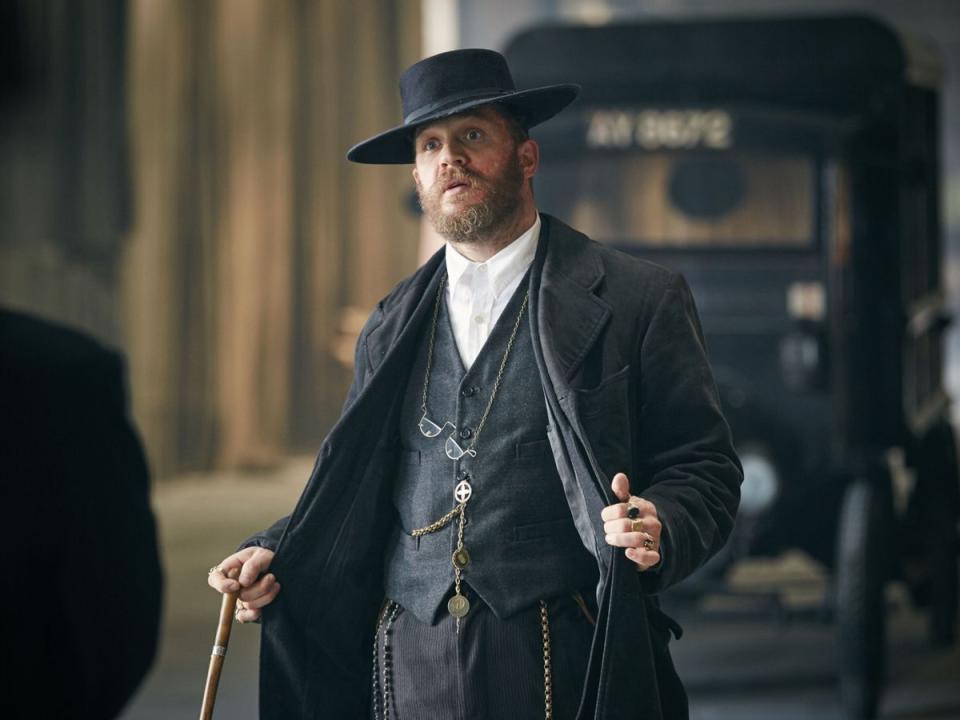What We Learned From Cillian Murphy And Tom Hardy's New 'Peaky Blinders' Audio Stories

Just when you thought you'd had your fill of Peaky Blinders for 2019, in comes a surprise two-hander from Cillian Murphy and Tom Hardy to round off the fifth season.
Yesterday two new audio stories written by Steven Knight turned up on peakyblinders.tv. In the first, Murphy reads a short poem called 'The Ballad of Tommy Shelby', a title which really amps up the Western vibes. It's a little flashback to what Tommy was like as a tearaway young 'un, scampering around Birmingham and getting up to mischief, and then a lyrical explanation of how the young Tommy was traumatised by the First World War and decided organised crime was the sensible option when he got back home.
The second, 'The Gospel of Alfie Solomon' features Hardy in character as Margate's most wanted, Alfie Solomons, doing that thing he does where he tells you a long story which doesn't seem to have any point but is impossible to stop listening to, then suddenly has a very sharp and pointy point which makes you feel a bit scared but a bit thrilled too. So what did we learn from them?
Young Tommy liked attacking people with sticks
Or pretending to, at least. According to the poem, he was "one of them kids, walks around so quiet and brave behind the sleepy lids," one who, "never made a sound he didn't mean you to hear". And he would occasionally leap out from behind bins waving a stick about to frighten people. Just for a laugh, though! Honest!! Just a bit of harmless stick fun!!
The First World War was very much Not A Laugh
What a surprise. Tommy signed up in 1915, the poem says, and "went away in a ship to fight a million other kids and they all drew straws to see who eventually died". His experiences as a tunneller trapped underground are extremely vivid, and you get a suffocating sense of being trapped in the mud and the mire.
The horses were alright though
Tommy's affinity with horses is long-established, but the importance they hold for him is clearly drawn: "the kid came home knowing everyone but the horses lied".
Seeing that devastation brought the Shelby Company Ltd into being
Again, this isn't entirely new ground, but Tommy's motivations in getting the family business together are neatly done. "I'll gather up my brothers and we'll gamble our souls away," Tommy says, vowing to become "the soldier of the living lost". Then there's the key takeaway from the trenches: "It wasn't about what you deserved, but what you got."

Alfie's dad wasn't an ideal father figure
Alfie doesn't like the idea that things become worse over time. "Some things are just born bad," he says. It's like his dad, who he says was "a dispenser of semen... a barbarian". "He did not tend the seed... he stayed only long enough to piss on the compost," he goes on.
His hat is the seat of his power
Alfie says the most he ever saw of his dad was his hat, size eight and a half, made in Luton. That hat is the one he still wears, and it bears this inscription inside from a mercury-maddened hatter: "This hat is a kettle in which to boil up your wicked dreams and make a soup of your soul."
Which Alfie suggests is the main reason he feels compelled to put together plots and plans to advance himself. "When I wear it," he says, "the schemes and proposals come out of the darkness."
Young Alfie was actually quite Bane-y
As an "untended and wild" boy, Alfie had to endure anti-Semitic pummellings from other local kids from the Christian schools, but he drew on the arc of another supervillain. "Every time I got stomped down I fucking stomped back up again, mate," he says. "I survived out of spite." Sounds a lot like Batman's yet-to-be-invented foe Bane, who Hardy played in The Dark Knight Rises.
He's haunted by the murders he's committed
After spending his time trying to find "ways around, ways to undermine" his opponents, Alfie's found that "it is easier to deal with the complainant than the complaint". That means he's had a hand in the deaths of 35 men, "all of whom, I'll have you know, attend my dreams each night in various disguises, in regular order, with no pattern or logic to it". When he wakes up in the morning, his sheets "have to be wrung out from sweat".
But he doesn't feel that guilty, really
Not one tiny bit, in truth. Why? Passchendaele. Take one second of Alfie's time as an artillery man in that battle. "In that one second of one day of one month of four years," he says, he'd swing a shell into a cannon: "Another boom, and there, in the mud, over there, lie 36 men – brown bread." But, he reasons, "in God's ledger," those 36 men mean less than the 35 he's killed since. What's the deal?
Here endeth the lesson
Finally we get Alfie's worldview, in one sentence: "There is no good and there is no bad that is categorical in this world beyond the calculations of powerful men who shift the definition according to their own selfish schemes of accumulation."
Like this article? Sign up to our newsletter to get more delivered straight to your inbox
You Might Also Like

